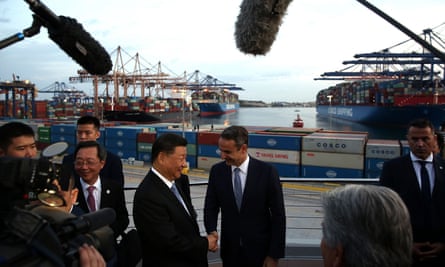The idea of Xi Jinping as a modern-day Odysseus seems a little far-fetched. But China’s globetrotting president proved a match for Homer’s hero last week when he trundled a Trojan horse deep inside the EU city gates – with an enthusiastic helping push from the Greeks. It was a classical, even epic, piece of opportunism.
Xi’s visit to Athens marked a breakthrough moment in China’s decades-long siege of Europe’s markets. A series of deals will raise its investment in Greece to around €2.5bn. More significantly, Xi expanded Beijing’s foothold in the strategic port of Piraeus, from whence a rising tide of Chinese imports flow into the EU.
By co-opting an EU and Nato member into his all-encompassing Belt and Road initiative and effectively hiring it as a bespoke “gateway to Europe”, Xi advanced China’s overall global ambitions. The demarche also highlights a bigger, possibly existential, challenge for the EU: how to avoid becoming the meat in the sandwich between a ravenous China and an increasingly unreliable, surly and hostile United States.
A key platform in Beijing’s strategy is the so-called “17+1” group that comprises China, 16 CEE (central and east European) countries and now Greece. Leading EU powers such as Germany and France are suspicious, fearing the 17+1 is an attempt to divide Europe. The EU commission declared China a “systemic rival” in March after Xi embarked on another horse-trading expedition to Italy.
Recent speeches in Athens and Berlin by Mike Pompeo, the US secretary of state, have stressed the strategic and geopolitical dimension. He warned Europe was being sucked into a nefarious Chinese web already spanning Asia, Africa and Latin America. China was “using economic means to coerce countries into lopsided deals that benefit Beijing and leave its clients mired in debt,” Pompeo claimed.
China is trying to mitigate such fears. It has pledged to respect EU rules and agreed to a 17+1 statement referencing the “three pillars of the United Nations” – peace and security, human rights and development. That was an obvious sop to western concerns about human rights abuses in Xinjiang and Hong Kong.

Yet however it is presented, the advance of Chinese business, financial and political influence across Europe appears irresistible. China is already the EU’s largest trading partner. Chinese mega-companies such as Huawei are on the march, defying US opposition. Austerity-hit countries crave investment, from any source. Last week saw another symbolic power play, with Jingye’s purchase of British Steel.
EU leaders such as the French president, Emmanuel Macron, and Annegret Kramp-Karrenbauer, Germany’s defence minister and presumed heir to Angela Merkel, are well aware of Xi’s advance from the east. AKK, as she is known, recently suggested Germany should support “our partners in the Indo-Pacific region” who feel threatened by China’s new military assertiveness. For risk-averse Berlin, that’s a big deal.
Right now, with a Nato summit due in London early next month, AKK and others are looking the other way – at the vexed question of the Trump administration’s waning commitment to transatlantic cooperation in general, and Nato in particular. Macron produced his own Trojan horse last week, suggesting the alliance might be superseded by what he fondly calls a “European defence union”.
Macron’s ideas about increased European financial, economic, security and political integration seem to have few takers. But his argument – that without it, Europe will be unable to hold its own against the US, China and Russia – has a certain logic. Macron accepts Donald Trump’s demand that Nato’s European members should spend more on defence. But he would prefer they did so separately from the US-led alliance, under EU, principally French, auspices.
Ulrike Esther Franke, an analyst at the European Council on Foreign Relations, suggests Macron may find a more sympathetic audience in Kramp-Karrenbauer, should she become chancellor. Both agree American international engagement is dwindling under Trump. “They both worry about the rise of China, the return of great power competition, and the risk Europe will be marginalised,” Franke wrote.]
The potential threat to Europe posed by the US, especially but not only if Trump is re-elected, extends beyond reduced military collaboration and unilateral US decision-making, such as its green light for Turkey’s invasion of Syria. Trump continues to denigrate the EU, pursue aggressive anti-European trade policies, appease Vladimir Putin’s Russia and push Britain towards a hard Brexit.
Boris Johnson’s blocking of publication of a British parliamentary investigation into Russian election and referendum meddling was condemned last week as “shaming” by Trump’s 2016 opponent, Hillary Clinton. Was Johnson’s unexplained decision an example of the influence exerted by Trump, who has repeatedly obstructed similar US investigations?
Suddenly, the plot of John Le Carre’s new thriller, Agent Running in the Field, in which American and British spies secretly conspire to subvert the EU, does not seem all that improbable. Increased British collusion and subordination to the US, partly resulting from London’s desperate need for a post-Brexit trade deal on almost any terms, will intensify challenges on the EU’s western flank.
Sandwiched between the perfidious “Anglos” on one side and the calculating Chinese on the other, and with Russians constantly on the lookout for ways to weaken the western democracies, the EU’s newly elected, untested leaders may struggle to keep the union safe, intact and prosperous.
Perhaps these big beasts smell blood? With the once-dominant, steadying figure of Merkel on her way out, with EU policy on Iran, Syria, Libya, Palestine, Ukraine and migration in tatters, with money short and with far-right nationalists and populists stalking a politically fragmented continent from Spain to Poland, the European project – like a modern-day Troy – is looking uniquely vulnerable.

